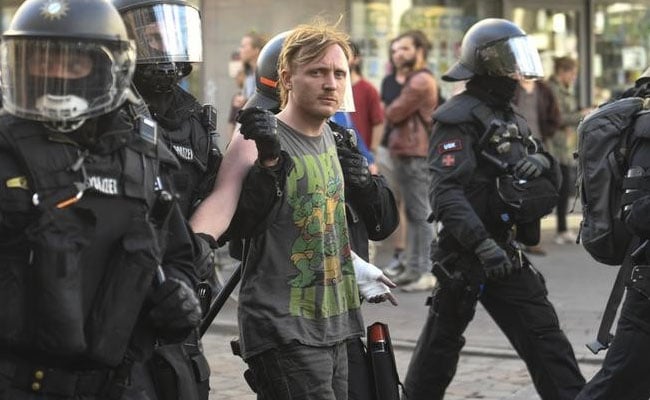
Anti-G20 protesters come out on the streets in Hamburg. (Reuters)
Hamburg:
Arab refugees watching anti-G20 riots in Hamburg from the relative safety of a falafel joint said on Saturday the rioters were insane for destroying their tolerant adoptive city and were astonished by what they saw as the police's restraint.
"If people did this in Egypt they would be shot," said Ibrahim Ali, a 29-year-old Egyptian who came here in 2011. "The state provides everything: housing, unemployment benefits and education. Yet those people are not happy. I don't get it."
Ali and two more refugees from Syria and Egypt were serving beer, falafel, hummus, tabouleh salad and other Middle Eastern delights to protesters who had started leaving the Sternschanze quarter as police special units moved in against the rioters.
"They are crazy. I can't believe my eyes," said Mohammad Halabi, 32, a Syrian who arrived in Germany as a refugee some 18 months ago. "They have such a beautiful country and they're destroying it."
Halabi, who speaks broken German, said he had been following the G20 only to see if world leaders would come up with a solution to end the civil war in Syria.
His expectation were low, he said, so he was not disappointed when he read on social media on Friday that U.S. President Donald Trump and Russia President Vladimir Putin had agreed on a ceasefire for southwestern Syria.
 "It's a joke. They are not serious," said Halabi. "They are simply interested in preserving their own interests in Syria and the Middle East."
"It's a joke. They are not serious," said Halabi. "They are simply interested in preserving their own interests in Syria and the Middle East."
'Not scared'
When he was not serving falafel, Halabi ran toward the square where rioters had set barricades on fire, and took pictures of police firing water cannon.
"This is nothing. I'm not scared," he said, sharing pictures with family members living in Turkey. "Bombs falling on your neighbourhood, that's scary."
Hours after police wrestled back control of Sternschanze, a traditional venue for leftist protests, residents and shopkeepers came out to inspect the extent of the damage.
Some helped municipal workers who had been cleaning the streets since dusk, removing glass, concrete slabs and stones that had been hurled at police.
All said they were angry at Chancellor Angela Merkel's decision to hold the summit in their port city as they had feared that militant members of the Black Bloc anarchist group would resort to violence.
"It's scary what happened here," said teacher Sandra Janowitz, 28. "But I don't blame the demonstrators. Most were teenagers who don't know what they're doing. And many were foreigners. They went home and we have to deal with this mess."
Merkel on Saturday defended her decision to hold the summit in the city of her birth, praised the police's security operation and said that residents would receive compensation.
Unlike native Hamburg residents, Halabi said he cannot be angry at Merkel.
"Without her I wouldn't be here," he said, referring to the chancellor's decision to welcome refugees.
(Editing by Robin Pomeroy)
(This story has not been edited by NDTV staff and is auto-generated from a syndicated feed.)
"If people did this in Egypt they would be shot," said Ibrahim Ali, a 29-year-old Egyptian who came here in 2011. "The state provides everything: housing, unemployment benefits and education. Yet those people are not happy. I don't get it."
Ali and two more refugees from Syria and Egypt were serving beer, falafel, hummus, tabouleh salad and other Middle Eastern delights to protesters who had started leaving the Sternschanze quarter as police special units moved in against the rioters.
"They are crazy. I can't believe my eyes," said Mohammad Halabi, 32, a Syrian who arrived in Germany as a refugee some 18 months ago. "They have such a beautiful country and they're destroying it."
Halabi, who speaks broken German, said he had been following the G20 only to see if world leaders would come up with a solution to end the civil war in Syria.
His expectation were low, he said, so he was not disappointed when he read on social media on Friday that U.S. President Donald Trump and Russia President Vladimir Putin had agreed on a ceasefire for southwestern Syria.

German police officers detain an anti-G20 protester in Hamburg. (Reuters)
'Not scared'
When he was not serving falafel, Halabi ran toward the square where rioters had set barricades on fire, and took pictures of police firing water cannon.
"This is nothing. I'm not scared," he said, sharing pictures with family members living in Turkey. "Bombs falling on your neighbourhood, that's scary."
Hours after police wrestled back control of Sternschanze, a traditional venue for leftist protests, residents and shopkeepers came out to inspect the extent of the damage.
Some helped municipal workers who had been cleaning the streets since dusk, removing glass, concrete slabs and stones that had been hurled at police.
All said they were angry at Chancellor Angela Merkel's decision to hold the summit in their port city as they had feared that militant members of the Black Bloc anarchist group would resort to violence.
"It's scary what happened here," said teacher Sandra Janowitz, 28. "But I don't blame the demonstrators. Most were teenagers who don't know what they're doing. And many were foreigners. They went home and we have to deal with this mess."
Merkel on Saturday defended her decision to hold the summit in the city of her birth, praised the police's security operation and said that residents would receive compensation.
Unlike native Hamburg residents, Halabi said he cannot be angry at Merkel.
"Without her I wouldn't be here," he said, referring to the chancellor's decision to welcome refugees.
(Editing by Robin Pomeroy)
© Thomson Reuters 2017
(This story has not been edited by NDTV staff and is auto-generated from a syndicated feed.)
Track Latest News Live on NDTV.com and get news updates from India and around the world

